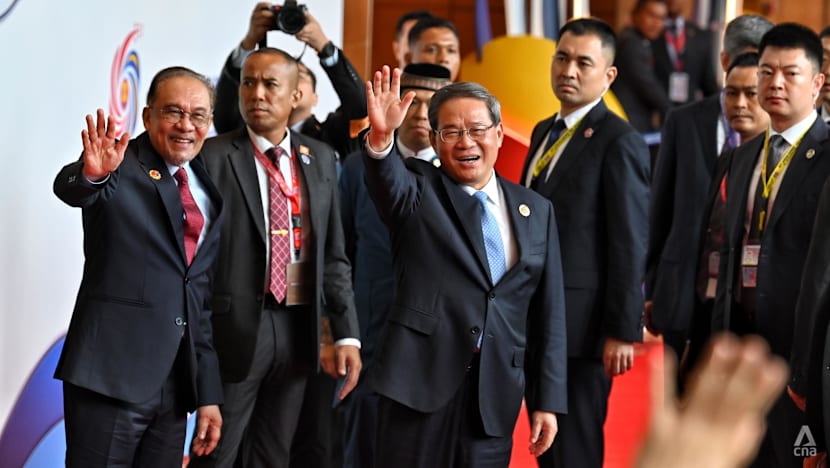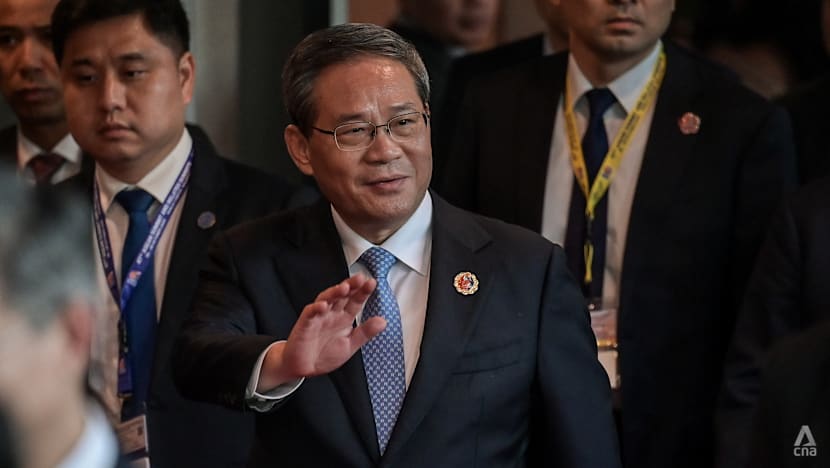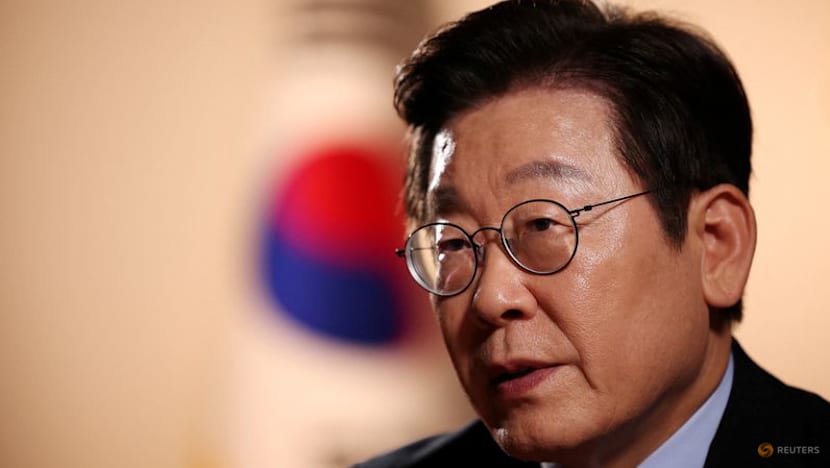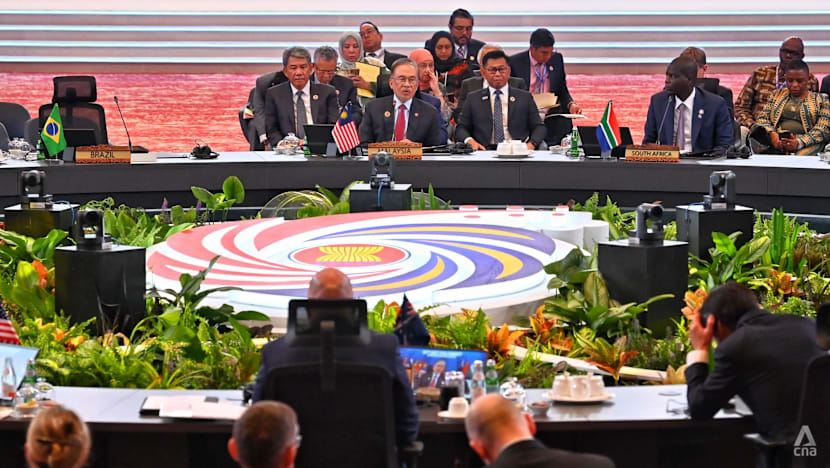China Premier Li Qiang slams 'high tariffs' as leaders at ASEAN Summit urge greater resolve for free trade
On the second day of the ASEAN Summit, various leaders stressed the importance of bolstering Asia Pacific’s economic resilience amid global uncertainties.

Malaysia Prime Minister Anwar Ibrahim (left) with China Premier Li Qiang (centre) at the 47th ASEAN Summit in Kuala Lumpur on Oct 27, 2025. (Photo: CNA/Zamzahuri Abas)

This audio is generated by an AI tool.
KUALA LUMPUR: Trade unilateralism and protectionism took centre stage on day two of the ongoing Association of Southeast Asian Nations (ASEAN) Summit in Kuala Lumpur, with leaders expressing concern over these issues and calling for a stronger commitment to uphold the rules-based multilateral trading system.
Leading the charge was China’s Premier Li Qiang, who pointed to “complex changes in international economic and trade structure, especially the disruptions from high tariffs”, in a veiled reference to the rounds of import duties that the United States has imposed on goods from a slew of countries, including China.
“We have a deep feeling that East Asia is faced with mounting difficulties and challenges in its economy and a growing instability and uncertainty in its development,” said Li on Monday (Oct 27) at the ASEAN Plus Three Summit, which involves the 11-member regional bloc, as well as dialogue partners China, South Korea and Japan.
"We must fully safeguard the hard-earned peace and stability in East Asia," Li said in a summary of remarks released by China’s state media, as he urged countries to "uphold free trade and the multilateral trading system, oppose all forms of protectionism, and continuously advance regional economic integration".
At another summit over the Regional Comprehensive Economic Partnership (RCEP) trade pact, Li said the international economic and trade situation has undergone complex changes, where “unilateralism and protectionism are rampant, bringing huge risks to the region”.
“The parties to the agreement should work more closely to address challenges and promote development,” he added, referring to the RCEP, which is the world's largest trade bloc that came into force in 2022.

Li also urged fellow leaders to preserve the multilateral trading system with greater resolve, adding that China “will always support ASEAN's centrality” and is willing to work with all parties to “uphold true multilateralism”.
China remains ASEAN’s largest trading partner for 16 consecutive years.
Over the past decade, ASEAN’s trade in goods with China more than doubled, hitting about US$722 billion in 2022 and accounting for nearly one-fifth of the regional bloc’s global trade.
The US and China are looking to avert an escalation of their trade war after Trump threatened new 100 per cent tariffs on Chinese goods and other trade curbs starting on Nov 1, in retaliation for China's expanded export controls on rare earth magnets and minerals.
Beijing and Washington rolled back most of their triple-digit tariffs on each other's goods under a trade truce, which is due to expire on Nov 10.
Various reports on Sunday said that Chinese and US economic officials have agreed on the framework for a trade agreement as US President Donald Trump said he was confident of hashing out a deal with Chinese President Xi Jinping when they meet in the coming days.
Trump kicked off his trip to Asia in Kuala Lumpur by inking trade deals with four Southeast Asian countries - Malaysia, Cambodia, Thailand and Vietnam - amid tariffs on US exports he has imposed on the region.
CALLS FOR RCEP TO BE EXPANDED
The RCEP - which includes all ASEAN members except newly admitted member Timor-Leste, as well as China, Japan, South Korea, Australia and New Zealand - held a meeting on Monday afternoon, the first time in five years.
The trade bloc has not held an official leaders' meeting since November 2020, when the signatories signed a trade deal aimed at lowering tariffs, boosting investment and allowing freer movement of goods within the region.
A joint statement by the 15 members stated that RCEP has played a pivotal role in contributing to regional economic integration and cooperation.
“We are also deeply conscious of the importance of strengthening the region’s economic resilience amidst current global and regional economic and trade uncertainties.
“In this context, we reiterated our firm commitment to enhancing the full and effective implementation of the RCEP Agreement as a vital step towards achieving the full potential of the region’s trade and growth,” read the statement.
In his remarks during the RCEP published by state media, China’s Li reportedly proposed three key directions for the trade bloc.
These included strengthening market connectivity and regional economic integration, while accelerating the expansion process, as he expressed China’s support for applicants such as Hong Kong in joining the RCEP.
Others include exploring deeper cooperation in areas such as market access, government procurement, digital economy, green development, and industrial and supply chains, and upholding the multilateral trading system with stronger determination.
“China stands ready to pool wisdom and strength from all sides to advance RCEP cooperation toward more practical outcomes and create a bright future of shared prosperity,” Li added.
Japan Foreign Minister Motegi Toshimitsu said RCEP members are facing various trade and investment challenges within the region, such as non-market policies and practices that cause excess capacity and undermine the level playing field, as well as the stable supply of critical minerals.
“The upgrade of the agreement is set to begin in 2027. All RCEP participating countries should engage in earnest discussions to ensure that the RCEP Agreement becomes rules that genuinely resolve regional challenges,” he added.
Meanwhile, Filipino President Ferdinand R Marcos Jr said the RCEP serves as a cornerstone of rules-based, transparent, and predictable trade, enabling continued growth and cooperation among member economies.
“Amidst today’s global uncertainties, which include shifts to inward trade policies, ASEAN’s commitment to a rules-based trading system remains our strongest anchor,” Marcos said during the RCEP summit in remarks published on the website of the Office of the President of the Philippines.
He also called for the early expansion of the RCEP to deepen regional integration, strengthen supply chain resilience, and reinforce ASEAN’s central role in shaping the region’s economic future.
“By doing so, we strengthen RCEP as a platform that drives prosperity, inclusivity, and ensures that our region remains a vital force in the global economy,” said Marcos.
Hong Kong, Sri Lanka, Chile, and Bangladesh have recently indicated their interest in joining the RCEP, which has been seen by some analysts as a potential buffer against tariffs imposed by US President Donald Trump's administration.
The RCEP opens the door to a market of over two billion people and encompasses roughly 30 per cent of the world's gross domestic product (GDP) across its 15 member nations.

COOPERATION PROTECTS ASEAN FROM “EXTERNAL SHOCKS”: PRABOWO
In his opening remarks at the ASEAN Plus Three Summit, South Korean President Lee Jae Myung stressed that when the ASEAN Plus Three summit was launched in 1997, it made a significant contribution to overcome the Asian Financial Crisis, and that his partnership is key amid the current global economic uncertainty.
“Thirty years later, we are once again confronted with new geo-economic crises such as trade protectionism and the restructuring of global supply chains,” said Lee.
“Against this backdrop, I believe that the ASEAN Plus Three leaders' statement on strengthening regional economic and financial cooperation is both timely and appropriate,” he added.
Singapore’s Prime Minister Lawrence Wong touched on the importance of regional collaborations, saying that the ASEAN Plus Three mechanism has thus far delivered "tangible benefits", from enhanced regional safety nets to stronger supply chains and better health security.
“The … positive agenda and track record puts us in a good position to navigate an increasingly unpredictable and challenging global environment,” he said.
Meanwhile, Indonesia President Prabowo Subianto emphasised the importance of strengthening regional integration, trade diversification, and financial safety nets as the core of the ASEAN Plus Three agenda.
“Indonesia recognises the contribution of trilateral cooperation among China, Japan, and the Republic of Korea to the entire region,” Prabowo said.
“To sustain growth and protect ourselves from external shocks, deepening this trilateral cooperation through regular summits and ministerial meetings will be very important,” said Prabowo.
REGIONAL SECURITY ISSUES ALSO DISCUSSED
While economic collaboration was the main theme across the various summits on Monday, issues relating to regional security also came to the fore at the East Asia Summit (EAS).
The EAS involves 19 participants, namely the 11 ASEAN member states, Australia, China, India, Japan, New Zealand, South Korea, Russia and the US.
In his opening remarks at the summit as ASEAN chair, Malaysian Prime Minister Anwar Ibrahim touched on various security and political issues such as the conflict in Gaza between Hamas and Israel, the domestic situation in Myanmar, the situation in the South China Sea and that of North Korea.
On Myanmar, Anwar said that besides engaging with the ruling military junta, Malaysia has invited all 27 of Myanmar's opposition groups to Kuala Lumpur to participate in a dialogue.
He said that the groups had been invited to Kuala Lumpur so that the bloc was seen to be engaging with all sides.
“And 27 groups, minorities, and parties did so in a very positive manner, coordinated by our foreign ministry,” said Anwar.
Myanmar has been in crisis since the military seized power in a coup in early 2021 against the elected government of Aung San Suu Kyi.
Anwar added that Myanmar’s acting President Min Aung Hlaing had been cooperative in engaging with Malaysia, with Anwar calling for a ceasefire in the country and mentioning ASEAN’s consensus on the need for inclusive, fair, and free elections.

Separately, the Malaysian prime minister said that there have been extensive discussions on issues relating to the South China Sea, with all parties looking to formulate a Code of Conduct.
The issue of overlapping territorial claims in the South China Sea - which is one of the world’s most contested waterways - has been a source of significant friction between China and several ASEAN nations, namely Malaysia, Brunei, the Philippines and Vietnam.
In 2023, ASEAN and China agreed on guidelines to accelerate negotiations, with a goal of completing the code within three years.
Anwar, however, said that as with all issues, they wanted it to be resolved within ASEAN and with their partners in the region.
“Because the moment it is seen to be imposed and dictated by outside forces, things become more problematic and tense.
“As far as we are concerned, things are still under control. We still urge strongly that all parties engage in these negotiations, universally recognised principles of international law, precisely the 1982 UNCLOS and the Code of Conduct,” he said, referring to the United Nations Convention on the Law of the Sea.
Anwar added that ASEAN was also concerned with the recent surge in the ballistic missile launches by North Korea (DPRK).
“Malaysia’s position is to continue with some form of engagement. Because once we call for engagement in all areas from Gaza to Ukraine to Myanmar, we should not preclude engagement with DPRK,” he said.
Meanwhile, India's External Affairs Minister S Jaishankar told the summit that terrorism posed a continuous and corrosive threat.
“The world must display zero tolerance; there is no room for ambivalence. Our right of defence against terrorism can never be compromised,” he was quoted as saying by the Times of India.
He added that as the world inevitably responds to new circumstances, new opportunities would emerge and resilient solutions would be devised.
“At the end of the day, the realities of technology, of competitiveness, of market size, digitisation, connectivity, of talent and of mobility cannot be ignored.
“Multipolarity is not just here to stay but to grow. All these warrant serious global conversations,” he said.
























